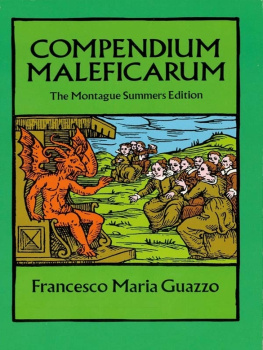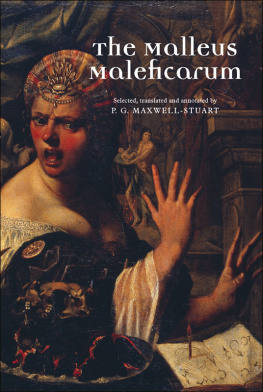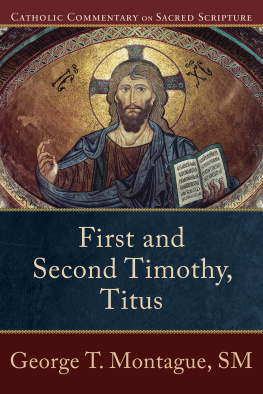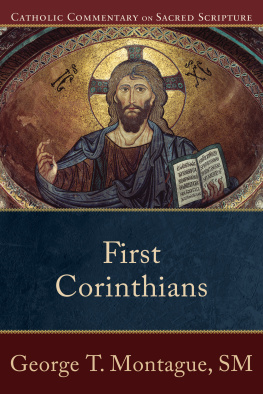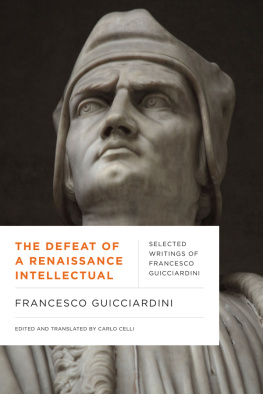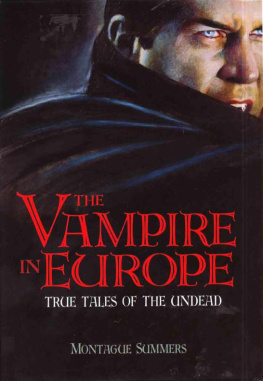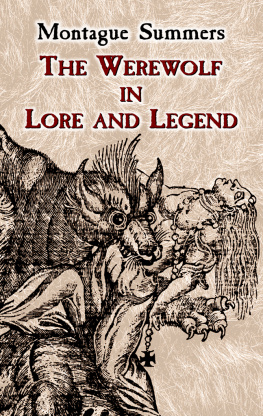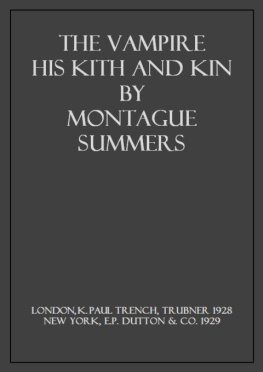
This Dover edition, first published in 1988, is an unabridged, slightly altered republication of the work originally published in 1929 by John Rodker, London, in an edition of 1275 copies. The 1929 title page reads: Compendium Maleficarum / Collected in 3 Books from many Sources by Brother Francesco Maria Guazzo of the Order of S. Ambrose ad Nemus / showing the iniquitous and execrable operations of witches against the human race, and the divine remedies by which they may be frustrated / Edited with notes by the Rev. Montague Summers... Translated by E. A. Ashwin. The dedication and the Preface to the Reader originally occupied two pages each. The page numbers in the prefatory matter have accordingly been altered.
Manufactured in the United States of America
Dover Publications, Inc., 31 E. 2nd St., Mineola, N.Y 11501
Library of Congress Cataloging-in-Publication Data
Guazzo, Francesco Maria.
[Compendium maleficarum. English]
Compendium maleficarum : the Montague Summers edition / Francesco Maria Guazzo : translated by E. A. Ashwin.Dover ed.
p. cm.
Translated from the Latin.
Slightly altered ed. of the work originally published: London : John Rodker, 1929.
9780486121109
1. WitchcraftEarly works to 1800. 2. DemonologyEarly works to 1800. I. Summers, Montague, 18801948. II. Title.
BF1565. G8313 1988
133.4dc19
88-9575
CIP
TO
THE MOST ILLUSTRIOUS AND RIGHT REVEREND
LORD ORAZIO MAFFEI
CARDINAL OF THE HOLY ROMAN CHURCH AND
EVER VIGILANT PROTECTOR OF THE
ORDER OF S. AMBROSE
FRA FRANCESCO MARIA GUAZZO
A HUMBLE BROTHER OF THE
SAME ORDER
GIVETH GREETING
O MOST vigilant Prelate, three years ago when I was attending the Court of His Serene Highness the Duke of Cleves and Jlich (who was vexed and bound by many spells of witchcraft), I put together and composed this book which I have called Compendium Maleficarum and I have, moreover, filled it with various and most ample examples, with the sole purpose that men, considering the cunning of witches, might study to live piously and devoutly in the Lord. And although it may provoke the idle jests of the censorious (for what is more difficult than to satisfy every palate?), yet I conceive that it will be of some avail to those who would escape the mortal venom of sorcerers. When I had, then, determined to print it, I began to look for a Patron under whose auspices it might be more securely brought to the light. Then, O most illustrious and Most Reverend Protector, whom no one has excelled in genius, gifts of mind and body and countless graces, did you stand out in my mind as one who has given public proof that your most eminent courage is joined to a like degree of learning, a Patron who, far from despising a humble writer, would rather extend to him your greatest favour and more than ordinary kindness. Having these considerations in my mind, therefore, I was assured that you were pre-eminently suited to act the part of a Maecenas towards such as devoted themselves to the furtherance of sound doctrine, among whom I count myself the humblest: and I determined to light this new-born work upon its way with the torch of your most Famous Name; and although you are worthy of a far nobler work, I venture to dedicate to you this little book which has not been compiled without some labour. And if (as is my hope) you will accept it wholly and generously with that fair candour which is yours, it may assuredly be expected that those carping critics, who will tolerate nothing that does not savour of perfect genius and unremitting industry, will turn a blind eye to its faults. Farewell: and may Guazzo be written among those who are whole-heartedly attached to you.
Milan, May, 1608.
PREFACE TO THE READER
A MONG the countless blessings which the Divine mercy daily confers upon the whole human race, and especially upon His faithful, I esteem this to be the most particular: the power to discover the malice and wickedness of our enemies, both visible and invisible. So that, recognising their cunning, we may counteract their stumbling-blocks and temptations. And since (Ps. lxxiii) the pride of them that hate God is daily increased and ever grows, and the venomous Enemy of the human race, whose fierceness waxes ever greater, does not fear to sow in our path the sharpest thorns of sorrow and tribulation and all sorts of maladies, although he himself is fearful of being tormented; therefore he essays his utmost to increase his own eternal punishment by leading as many men as he can to hell, and to deride, despise, and insult the most excellent and divine likeness of God which has been washed in the Precious Blood of Christ, and to turn mans freedom to slavery. Therefore each one of us ought to search his heart to keep it free from the malice of the devil; for he goeth about as a roaring lion, seeking whom he may devour; and even though his heart may be pierced and torn by his enemys weapons, yet the devil leaves nothing unattempted and dares everything. When he sees men of weak and timid mind, he takes them by storm: when he finds them dauntless and firm, he becomes as it were a cunning fox to deceive them: for he has a thousand means of hurting us, and he uses countless methods, superstitions and curious arts, to seduce mens minds from God and lead them to his own follies; and all these he wondrously performs by means of illusions and witchcraft. Therefore it is agreed that this sort of evils has been disseminated to the destruction of mens bodies and souls by the devil and his fiends through the agency of warlocks, witches, sorcerers and diviners; and in proof of this the present book will give a sure indication of the truth. And that each man may be able to guard himself, let him seriously read and carefully digest this book, which I have called Compendium Maleficarum ; for just as there are shown to be various means and methods of inflicting injury, so there are various remedies by which these harms may be met and dispersed when they are recognised. If therefore, reader, there be anything in this book which holds your attention and points you to the way to a remedy, I lift up my hands in thanks to God, who to His own greater glory, and the confusion of devils, has permitted the temptation of our souls that the just may be made perfect and the wicked cast into hell. Therefore the demons do but work in accordance with the design and permission of Almighty God.
EDITORS INTRODUCTION
T HE ancient origins of the local Milanese Order Ambrosiani or Ambrosini, of which Francesco-Maria Guazzo was so eminent and honoured a member, are buried in obscurity, although the Brethren themselves, perhaps with more devotion than exactness, were ever wont to refer their foundation to no less a figure than the great S. Ambrose himself. It is very possible, and even probable, that some old traditions had actually been handed down from the illustrious Father who had taken so deep an interest in monasticism and so closely watched the beginnings of the cloister throughout his diocese. However that may be, in the earlier decades of the fourteenth century certain solitaries and hermit priests dwelling near Milan gradually adopted the cenobitic life, making it their pious custom to assemble at stated intervals during the day for solemn office and united prayer. About this very time three young nobles, Alessandro Crivelli, Alberto Besozzo, and Antonio della Pietra-Santa, disgusted with the licentiousness of the aristocratic society and court of Giovanni II, had sought refuge in retreat from the world, and taking as their anchorhold a wood not many leagues from the city, here they built a humble chapel which soon became the common oratory of a regular community, and this forest sanctuary may not untruly be said to have been the cradle of the Ambrosian Order. In 1375 Pope Gregory XI, who some twelve months before had approved the Congregation of the Spanish Hermits of S. Jerome, gave the Milanese frati the Rule of S. Augustine, adding thereto a number of particular constitutions, and assigning as their name Fratres Sancti Ambrosii ad Nemus. They were, moreover, empowered to elect their own superiors, subject to the confirmation of the Archbishop of Milan. A habit was prescribed with broad scapular, a stuff girdle pendent as is the Augustinian cincture, a voluminous cowl and capuce, a mighty mantle in which to walk abroad, in colour all of chestnut brown. The Ambrosian Liturgy, both for Mass and choir, must be followed. The Order henceforth was canonically established.


